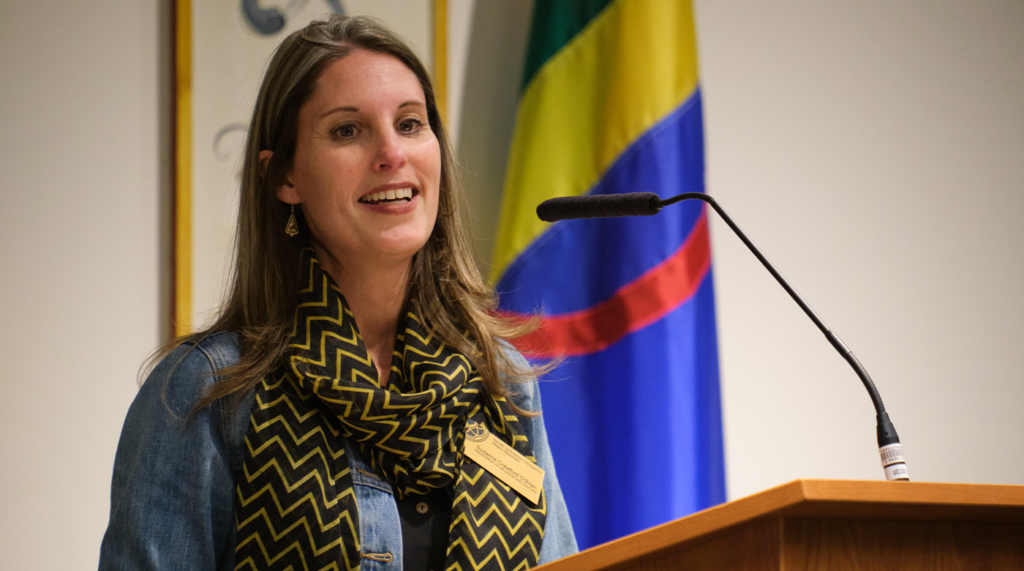Page 42 • (706 results in 0.046 seconds)
-
Rediscovery: Dr. Jenkins and the Texts of Hermann Broch Occasionally, we are fortunate enough to find things that are more exciting than what we are searching for. This is certainly true for Dr. Jen Jenkins, Associate Professor of German in the Languages and Literature Department at Pacific Lutheran University. Dr. Jenkins spent the 2016-2017… December 4, 2017
-
. Emphasis will be placed on developing evidence-based practitioners that critically utilize the scientific literature in their professional endeavors in Kinesiology. (4) KINS 505 : Inclusive Leadership The course is designed to explore cultural factors that influence people and human interaction. Specifically, students will study the role of diversity and the experiences of people with marginalized identities in United States sport organizations. The various ways that people may differ and how this
-

think the value of literature and writing is even more paramount as we move forward, because it’s acting as kind of a resistance to forces in our culture that want to reduce or simplify experience,” Barot said. “What literature does is restore complexity to the things that people feel and do and think, and celebrate complex emotional, social, intellectual experiences.” As for the future of the Rainier Writing Workshop, Barot looks backward and forward, always with the founders’ vision—and
-

year really motivated both students and faculty, and we were able to bring that motivation into the classroom through applied projects. Faculty were able to bring these issues into discussions of literature, history, philosophy, ethics, and environmental equity. How have faculty, staff and students responded to that challenge? I’m continually amazed at how my colleagues pivoted so quickly to online classrooms, how they spent the entire summer learning very different kinds of pedagogies and
-
researched language pedagogy and literature with the department of Languages and Literatures. Xiang Fengjing Shaoxing University, Shaoxing, Zhejiang, China Xiang Fengjing researched language pedagogy and literature with the department of Languages and Literatures. Zhou Jie Fuzhou University, Fuzhou, Fujian Province, China Zhou Jie researched language pedagogy with the department of Languages and Literatures. Hu Zili Chengdu, China Zili served as a Fulbright Foreign Language Teaching Assistant (FLTA) for
-
Course Descriptions RELI 131 : The Religions of South Asia - RL, VW, GE Hinduism, Buddhism, Jainism, and Sikhism - their origins and development, expansion, and contemporary issues. (4) RELI 211 : Religion and Literature of the Hebrew Bible - RL, IT This course introduces students to the critical study of the books in the Hebrew Bible Canon. Students will become familiar with the socio-historical context of these biblical books and their major theological themes; explore in depth a
-
" is a term often used but rarely defined in environmental studies. This project explores critical animal studies literature to construct pedagogical themes in how to raise attentiveness towards multispecies worlds in the context of bird-watching practices. Olivia PetersenGlobal and Cultural Studies and Gender, Sexuality, and Race StudiesA Culture of Peace: Likhet, Genocide, and Affective Economies in Norway Faculty Mentor: Rebecca Wilkin, Global and Cultural Studies This research project pulls
-
History Degree,Study History,American History,European history,Latin American history,East Asian history Hispanic & Latino Studies Hispanic & Latino Studies Program Details major & minor Undergraduate College of Liberal Studies Hispanic Studies,Latino Studies,Latinx studies,Spanish language studies,linguistics,Spanish literature,hispanic,latino,latinx,language,languages,cross-cultural,Spanish,Mexico Global Studies Global Studies Program Details major & minor Undergraduate College of Liberal Studies
-
EUPHONIUM BM Performance of at least two works of contrasting styles (concerto, etude, sonata, through composed original literature). Performance quality must be at or near that of a good conservatory student. All major and minor scales (all three forms) and arpeggios. Scales and arpeggios must be played 2 octaves from (concert pitch) low E to Bb, and one octave from B to Eb. Students with fourth valve will play all scales and arpeggios for any note in two octaves minimum. Two-octave chromatic scales
-
want them to learn to do. Then you assess what they do, with clear criteria and standards. The assessment can be done via such things as: Simulations Demonstrations Team projects Explication activities (for example, in literature) Writing Some Classroom Assessment Techniques (CATs) Foundational KnowledgeHere, you just want to determine if students “understand and remember” important concepts, terminology, principles, etc. Possible Assessment Procedures: Traditional kinds of paper/pencil tests Drill
Do you have any feedback for us? If so, feel free to use our Feedback Form.


